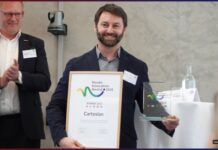Den nederlandske trendforskeren, Adjiedj Bakas, har sett nærmere på utviklingen i energimarkedet, eurosonen og klimaforandringer for de neste 10 årene. Han reiser til USA senere i sommer for å få unik innsikt i det som vil skje på teknologifronten fremover, og skal besøke blant annet Google og IBM sine hovedkvarterer. Her er et lite utdrag fra Bakas sitt arbeid så langt i 2014.
We celebrate the summer now in Norway. After a rainy winter with less snow, cold and ice than we are used to in the Nordics. Climate change begins to show now and ten years from now we will be used to it. Our weather will look more like the weather in the north of France, and we maybe even produce our own wine by then. An inspiring foresight, I would say. The ongoing crisis in the Ukraine is about energy. The Crimea waters harbor enormous reserves of oil and gas. And eastern Ukraine is the base of weapon factories that have worked almost exclusively for Russia for decades: Russia cannot bear to lose them as a lifeline or its army would be cut off.
Energy is a major issue now, and ten years from now it will still be a major issue. The future of energy is a hybrid mixture of fossil and renewables. This summer the German government announced that building enough windmills will cost more than 1.000 billion euros, and the total costs are estimated to rise to 1.200 billion euros. German households will pay a lot more for energy, between 1.000 and 2.400 euros annually extra, while energy prices in Europe are already three times as high as in the US.
Steep energy prizes are already the cause of industries relocating. BMW announced that, because of the short sighted energy policy of the German government, it is building its newest, largest factory in the US, and not in Germany. Chemical giant BASF is relocating factories too from Germany to the US, and many German companies are investing less in Germany and more abroad. Meanwhile Germany cannot run on windmills. The Energiewende (Energy Transition) has turned into a disaster. Ten years from now the Germans will have learned from this and their energy economy will again be different from now.
Oil and gas will be constant factors in the worlds energy economy, so Norway will do fine. Shale gas is on the rise and Norway, together with Poland and the UK and France, has the largest reserves in Europe. No worries there either. Meanwhile inspiring innovations are coming to us. In the Netherlands a 19 years old student, Boyan Slat, came up with a brilliant idea to clean the oceans within 5 years of all the plastic garbage. With a mixture of crowd funding and help from classic financial institutions he might be able to turn this into reality sooner than anyone ever expected. China is buying itself into creative technological companies. The first self-steering cars hit the streets in California. MIT developed flying windmills in the USA. Bitcoin and its Dutch equivalent the E-Guilder are making roads and the Bitcoin-infrastructure can change the way the financial industry operates. For the impoverished Eurozone this might be a solution: all the countries can return to their original currencies and the euro can live on as a kind of Bitcoin, for export and international trade only. It would solve a lot of problems in the Eurozone where unemployment is now higher than in the 1930s.
The recent elections for the European Parliament show how disenchanted European voters are with euro and EU: many people ignored the elections and voted with their feet, and anti-euro-parties were successful in Italy, Germany France and the UK. The wisdom of Norway not to join EU or euro is clear. Yet we have to deal with our impoverished neighbors (the euro costs the Dutch 720 billion euros, almost twice the money Norway saved from the oil revenues) in smart ways in the near future. A renewal of trade and trade relations is due to occur. Therefore the future starts today!
Author: Adjiedj Bakas
Trendwatcher Adjiedj Bakas is co-author with Truls Berg of the book “Halvveis til Fremtiden.” He is available for new inspirational trend lectures in Norway in the fall of 2014, after his return from his visit to the headquarters of Google and IBM’s Watson division in the US. He eagerly shares his knowledge and experience with you. Bookings through his agent in Norway, Inspirator AS. (visit www.inspirator.com for more info about Adjiedj and his lectures)








